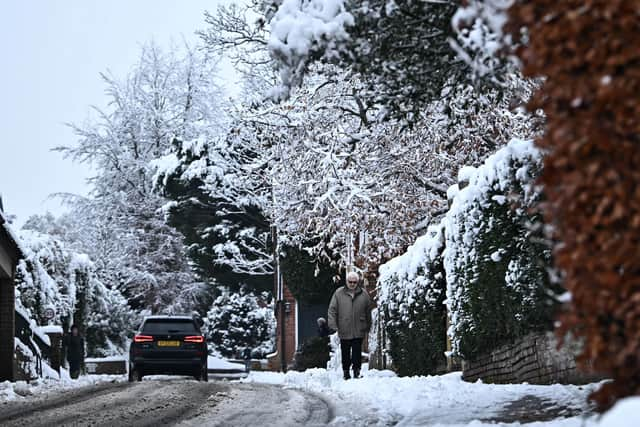How cold does it have to be to not work in the UK? Your legal rights and lowest temperatures explained
and live on Freeview channel 276
The country is braced for plummeting temperatures as the Met Office warn of snow and ice set to hit large swathes of the UK in the coming days.
Weather maps show that most of the country will be affected by these conditions and many people are wondering whether it’s safe to go to work.
Advertisement
Hide AdAdvertisement
Hide AdHere, we take a look at what the weather warnings could mean for workers.
How cold does it have to be to not work?
Safe working conditions are crucial in any workplace in order to maximise productivity and reduce the risk of illness or injury. However, many workers are unaware of the specifics in relation to maximum and minimum temperature conditions.
There is currently no specific law stating what temperature it should be for it to be deemed too cold to work. However, the Workplace (Health and Safety Welfare) Regulations 1992 state that working conditions must be kept at a reasonable temperature.
What is deemed a reasonable temperature may vary depending on the type of work you do and whether you are based outside or in an office capacity.
What is the minimum working temperature in an office job?
Advertisement
Hide AdAdvertisement
Hide AdThe Approved Code of Practice states that any sedentary workplace should be heated to a minimum temperature of at least 16 degrees. This applies to office environments such as call centres, offices and public reception areas.
Temperatures can go as low as 13 degrees if you work inside but your job involves manual labour. Examples of this would include warehouse work.
All of these workplaces are expected to have toilets and hand basins, with soap and towels or a hand dryer. Drinking water also has to be available for employees.
John Kushnick, Legal Operations Director at National Accident Helpline advises that employers have a duty of care during extreme weather conditions, rather than a legal obligation: “Unfortunately, there are no laws which specifically state that workers can stop working if the temperature gets too hot or cold.
Advertisement
Hide AdAdvertisement
Hide Ad“However, every employer has a responsibility to maintain a safe working environment and must protect the wellbeing of their employees under UK law. This legal obligation is otherwise known as duty of care. If an employer neglects their responsibility, and this results in someone falling unwell or being injured, that person may be able to claim compensation.”


What is expected of my employer?
White states that employers have a responsibility to safeguard their workers’ wellbeing. This applies even when they are working from home. If staff become ill from the cold, especially those who are vulnerable or with underlying health conditions, employers could find themselves facing legal action.
White said: “Employers are expected to do whatever is ‘reasonably practicable’ to safeguard their workers’ wellbeing, and they must provide a safe environment where staff are not at risk of falling ill from the cold. The principle applies to all employees, even those working from home.
“This requires carrying out regular risk assessments and acting on the results. Employers must also take into consideration those with existing health conditions that could be affected to a greater extent by the cold temperatures, such as those who are medically vulnerable or pregnant. In particular, those employees with heart/circulation and breathing problems such as emphysema may be more sensitive to working in cold temperatures.”
What is the minimum working temperature when working outside?
Advertisement
Hide AdAdvertisement
Hide AdIf your work takes place outdoors, then there isn’t a specific minimum temperature guideline. However, your employer will have a duty of care to manage the risks of working outside. This could involve more frequent breaks during cold weather and providing suitable protective equipment.
White said: “It is clearly not practical to maintain a workplace temperature in excess of 13 degrees where the work is being done outside, or if the job involves working in freezers. However, it is critical employers take all reasonable steps to reduce the obvious risks to employees which arise from working in cold conditions. It is important that employers are aware of the actions which can be taken to limit the health impact of working in cold temperatures.”
The Health and Safety Executive offers a thorough list of steps which can be taken. Some of the key points are:
- Providing warm rest areas with facilities to make hot drinks
- Providing suitable equipment and protective clothing such as hats and gloves and for manual workers, clothing should be waterproof and breathable.
- Keep air-flow to a minimum to reduce drafts and protect workers from the cold
- Rotation of work from a cold to warm area or scheduling jobs for the warmer part of the day
- Special precautions for those working outside in the cold.
Are employers obliged to pay staff if they can’t get to work in bad weather conditions?
Your employee can ask you to use annual leave if you’re unable to attend work due to icy weather conditions, snow or other forms of bad weather.
Advertisement
Hide AdAdvertisement
Hide AdIf your workplace offers flexible working or a hybrid option they can ask you to carry out your work from home or make up for the time you have missed by working extra hours at a later date. This would entirely depend on your contractual agreement with your employer.
If your place of work is closed due to poor weather conditions and there is no remote option available then your employer should not deduct any pay from your salary.